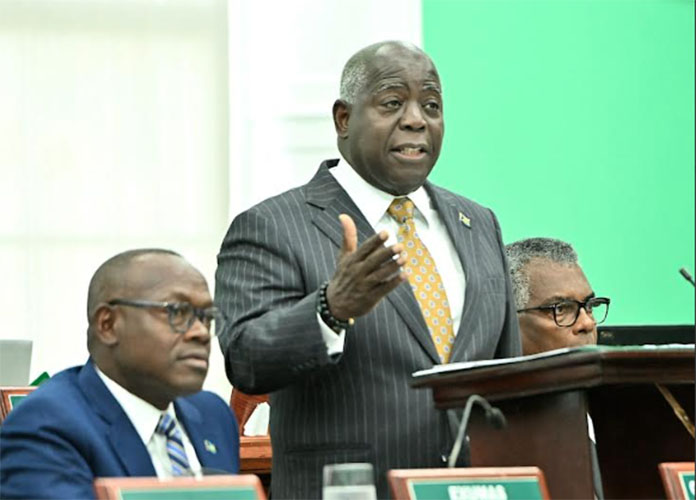
July 16, 2025
“Madam Speaker,
I rise today on behalf of the people of Cat Island, Rum Cay, and San Salvador, and on behalf of every Bahamian who has wondered if land reform would be realised within their lifetime.
I grew up on Cat Island, where land represents heritage and stability, where a plot of land could feed a family for generations and be passed down across centuries.
The story of our land is a critical part of our personal histories.
There are instances where land has been passed down from the emancipation era – these are generational properties that our ancestors literally toiled and bled for.
Considering this legacy, it is alarming to think that we have a system that fails to adequately protect the inheritance of our people.
We currently have a system rife with loopholes that allows land, as the main building block of generational wealth, to slip away from the grasp of everyday Bahamians.
This is unjust and unacceptable.
Madam Speaker,
We are at the start of a new budget cycle, having debated and passed a budget focused on expanding opportunities for all Bahamians.
I cannot think of a more fitting topic to debate today, in our first debate since the budget debate, than the Land Reforms before us, which will expand opportunities for more Bahamians to be landowners by helping them to gain clarity and assurance on their inheritance.
This is what this administration is all about, Madam Speaker.
We are committed to expanding opportunities for Bahamian ownership.
We want to empower more Bahamian business owners, so we are providing widespread support for small and medium enterprises.
We want to create more Bahamian homeowners: our affordable homes and rent-to-own initiatives have that covered.
We also want more Bahamians to be able to afford to be owners in their country. Because what’s the point of building affordable homes if people don’t have the funds to make mortgage payments? That’s why we are maximising employment opportunities, securing high-quality jobs for Bahamians that are currently held by non-Bahamians, and investing heavily in education: through BTVI and UB, through our public school reforms, and through the new digital Upskill Programme.
We are tackling this issue from all sides.
Naturally, land reform represents the next frontier for reforms that our country desperately needs as we rid ourselves of the broken systems of the past.
We want Bahamians to own more than just a piece of the pie – Bahamians should own a majority of the pie in The Bahamas.
This is the land of our birth, and we should all feel empowered to be owners in this country.
And we shouldn’t have to be rich or well-connected for ownership to be a reality.
This is the future we have been fighting for from day one.
And land Reform must be a part of this fight.
Our people deserve nothing less than a system that supports their dreams.
Unfortunately, a significant portion of land throughout our archipelago lacks a clear title.
There are numerous cases where generational property has been passed down with conflicting claims or without official records.
There are too many cases in our courts where each claimant claims to have valid but conflicting documentation.
Sometimes, multiple people claim the same piece of land, and each party truly believes the land is theirs.
Today, with the Registered Land Bill, 2025 and the Land Adjudication Bill, 2025, we are taking meaningful steps toward fixing what’s broken with the way we register land and handle land disputes in our nation.
Madam Speaker,
For far too many years, this outdated system has impeded progress.
Parents attempt to pass on property to their children, only to be told that they don’t own the land that they thought they owned.
Family members get together to start a business, only to spend years fighting other groups over ownership in court.
What should have been a move toward financial empowerment for that family becomes a financial burden, as expensive legal fees become a barrier to justice.
Oftentimes, the wealthier parties in these cases win through a war of attrition as the financial toll of a land dispute becomes too costly, and families have no choice but to give up on fighting for their inheritance.
It’s not by chance that things tend to play out this way.
The wealthy and the learned often exploit the loopholes, weaknesses, and chaos in our land laws and systems for personal gain. It is a classic case of the rich getting richer as the poor get poorer.
Meanwhile, many Bahamians are left unable to sell, lease, or mortgage their land.
Businesses see opportunities but won’t build on questionable titles.
Investors want to develop areas but are wary of the questionable land records.
There have been countless Bahamians who lost their birthright due to this broken system.
This state of affairs was inexcusable decades ago when Bahamians first began clamouring for change.
But for these same issues to still exist in 2025 is shameful.
Fortunately, those days are now coming to an end.
Madam Speaker,
We have consulted widely with virtually every major stakeholder throughout a lengthy consultation period to ensure that we get this reform right. And I believe we have succeeded.
Thanks to the Bills before us today, we will have Land Adjudicators officially clarifying ownership rights once and for all.
We will establish Land Tribunals that hear and render fair decisions in land disputes, eliminating the need for expensive and lengthy court proceedings.
We’ll bring clarity to the registration of land, creating one official, indisputable record.
We will modernise how land rights are recorded, moving from a deeds-based system to a modern, title-based system, making it easier to sell, inherit, mortgage, and develop land.
And we will give investors confidence that there are no hidden claims on the land that will serve as the foundation for their investments.
Madam Speaker,
The Land Adjudication Bill 2025 allows the Minister responsible to declare Adjudication Areas for the purposes of officially settling any issues with land ownership in the area.
After an Adjudication Area is designated, a land Adjudicator, who will be a senior lawyer with a minimum of ten years of experience in land law, arrives with a team of local assessors, demarcators, surveyors, and records officers to delineate boundaries, survey the area, and develop a comprehensive understanding of the history of ownership in the area, including all parties who claim to have a right to land ownership.
All involved parties are then required to file a claim with evidence to support their claim.
As a part of this process, the rights of those who are overseas, missing, not yet of age, or otherwise deemed unfit to participate are safeguarded.
Additionally, any ongoing court cases are stayed to prevent potential conflict with the adjudication process.
All land disputes are heard by a Land Tribunal, comprised of the Adjudicator and two local Assessors, who will make a decision based on the facts at hand.
These adjudications are guided by the principles of fairness and justice.
In instances where an individual or group has treated the land as their own, for example, they may have been paying taxes and maintaining it: in most cases, if they have possessed that land for 12 years, they will become owners of the land.
If it is Crown Land, the period required for ownership is 30 years, and for beachfront or foreshore property, the period increases to 60 years.
At the end of all the reviewing of records, surveying and demarcating, hearing disputes, and determining ownership rights, an Adjudication Record will be created outlining the owners of the land, the exact specifications of the land they own, what rights they have, the type of title they have – whether it is absolute or provisional – and whether there are any easements or other rights affecting the land.
Once this process is finalised, it will stand as the official record clarifying all ownership rights within the adjudication area.
Anyone who disagrees with the decision is free to make their objection known and notify the Adjudicator of their intent to appeal the decision in Court.
So, the adjudication process does not, in any way, take away a person’s ability to have the courts rule on the matter.
It is a process designed to provide a fair decision for all involved parties based on the evidence, as a cost-effective and more efficient alternative to going to court, so that anyone with an ownership right has access to justice.
We are putting an end to the system in which the wealthy choose to take lower-income opponents to court, knowing they don’t have the funds for a prolonged battle.
Instead, fair and equitable outcomes are now within reach for everyone.
Madam Speaker,
The other Bill before us, the Registered Land Bill 2025, will finally modernise the legal framework for the registration of land.
This law establishes a new land registry where records will be organised and held securely. There will be no more files getting lost and no more confusion and chaos.
Once again, many Bahamians have complained about falling victim to the systemic chaos when files conveniently go missing at the most opportune time for their opponents in a land dispute.
This has been allowed to happen for far too long. But those days are finally over.
This Land Registry will be overseen by a Registrar of Lands who will be a seasoned legal expert with a decade or more of experience, supported by staff dedicated to ensuring the proper registration of land.
The two Bills before us are complementary in that the Adjudication process clearly identifies and officially declares the owners, and this Bill ensures that permanent records are stored and secured.
After the Adjudication process, the land is registered at the Land Registry with a unique identification number, and any and all owners are reflected in the official records.
When a sale or transfer occurs, this record is able to be updated swiftly, and the same goes for any mortgages.
This comprehensive Bill also outlines the process for the registration and protection of leases, as well as re-parcellation and the division of land for subdivisions and estates.
Legal clarity is given on the transfer of land by death and bankruptcy, and numerous ways to protect interests in land are outlined, including inhibitions by the courts, cautions by individuals or banks with interests in the land, or restrictions by the Registrar due to fraud or any other sufficient cause.
Owners are provided with land certificates indicating their ownership rights, and lease certificates are likewise provided to lessees.
In the interest of expanding access to information, any member of the public will also be able to search the land register themselves, provided they receive an official search certificate from the Registrar.
So, if you want to see the official information, you can go and see it yourself. No need to go through a third party; no worries about anyone pulling the wool over your eyes.
Madam Speaker,
This Bill, like the Adjudication Bill, also recognises the gaining of land rights by long-term possession and sets out the process by which a person can successfully acquire title in this way.
The process also allows for rectifications to be made by the Registrar or by the courts, and in instances where, due to an error, a person is deemed to have incurred a loss, they may have a right to indemnity – to be compensated for their loss – assuming that the loss was not incurred because of fraud or negligence on their part.
And, of course, if any person is aggrieved by a decision made by the Registrar, they are entitled to appeal the decision in the courts.
These are just a few of the main elements of this expansive Bill.
Madam Speaker,
We have developed and introduced two comprehensive land reform Bills, instilling much-needed confidence in our land registration system for the many Bahamians who need security in knowing the official records grant them undeniable rights of ownership.
At the end of this reform process, due to the clarity provided, mortgages and property sales will be processed faster.
Developments can move forward with certainty instead of confusion.
Parents and grandparents can confidently pass land on to their progeny without worry that it will slip away or be snatched away.
And inheritance disputes can finally be resolved in a way that honours the facts, the historical records, and the rights of all parties.
For the many Bahamians who have struggled for years with ongoing, seemingly never-ending land disputes, this is a big deal.
These Bills represent light at the end of the tunnel and a possible solution to years of headaches and heartaches.
When we say that we are here to change the status quo, these are the kinds of changes we are talking about – not small, incremental changes or going after the low-hanging fruit, but addressing the longstanding problems that have plagued Bahamians for generations.
This is what we have been doing throughout the past three and a half years – not just with land reforms but with many of our most pressing issues.
Our predecessors were afraid of Cannabis reforms, but we are tackling those reforms head-on.
Our predecessors lacked the vision to fix BPL, but we understood the necessity of change and we launched the largest energy reform initiative in our nation’s history to lower bills and to take us to a solar-powered future with a reliable power supply.
We signed 57 labour agreements and rolled out a public service-wide promotional exercise and public service-wide salary increase after years of stagnancy.
We built the first affordable homes in years to address the housing crisis, and we are responsible for decreasing absences in our schools by over 90% over the past three and a half years.
We are also the first government in our history as a nation to project a budgetary surplus, which is a significant improvement of the government’s fiscal health.
We are unafraid to take on the biggest challenges. In fact, we see these challenges as opportunities.
Being the first administration to truly address land reform is simply part of the wider trend of us fixing the things that desperately need to be fixed in this country.
Because where others see problems, we see solutions.
Madam Speaker,
This is just a glimpse of the new Bahamas we are building: a Bahamas where ownership of land is more accessible, a Bahamas where justice is within reach and no longer impeded by financial barriers, a Bahamas where we are committed to fixing the hardest, most complex problems because it is the right thing to do.
This is a moral imperative. The longer we delayed taking action, the more people were harmed by a broken system.
And the truth is, there is no other party willing to fix this problem but us. Too many people in powerful positions benefit from the broken system and lack the genuine desire to fix it.
That explains, at least in part, why making progress on land reforms has been so difficult in the past.
The first White Paper on Land Reforms was produced in the 1960s. So, we’re talking about six decades of inaction.
And the first draft Bills for land reform were produced in 2010 – three administrations ago. Yet it is only now, in 2025, that real change has arrived through the efforts of this Administration.
Despite all their talk about solutions, the members opposite had a chance to make a difference, and they chose inaction. They chose to leave a broken and oppressive system in place.
But this administration is choosing progress.
We are choosing respect for the Bahamian people and their wishes.
We are demonstrating our belief in the inherent and universal dignity that all Bahamians should have access to.
And, most importantly, we are building a country that supports the dreams of the Bahamian people.
In the new Bahamas we are building, you won’t have to be in the inner circle to feel included.
You won’t have to have the right last name or the right amount of money in your bank account to be treated with respect and be supported in pursuit of your goals.
Every Bahamian deserves access to opportunity.
And we will continue fighting to expand opportunity until our vision is made real.
The Registered Land Bill 2025 and the Land Adjudication Bill 2025 represent just two of the changes we are actively rolling out.
I thank the Attorney General and his Office, as well as the Land Reform Committee, which was co-chaired by the Member for Mangrove Cay and South Andros and Ms. Sharlyn Smith, for their hard work in driving the development and drafting of these landmark Bills. I know the process has been long and arduous.
However, this group, comprised of some of our top legal and public sector minds, got the job done. Their efforts paved the way toward the Bills before us today.
I also thank the many stakeholders who participated in the consultation process, providing their feedback and ensuring that we addressed the issues plaguing our land registration process.
Most importantly, I thank the Bahamian people for continuing to lend their support to this administration as we build a better Bahamas for everyone.
Thank you, Madam Speaker.
And may God continue to bless the Commonwealth of The Bahamas.”







